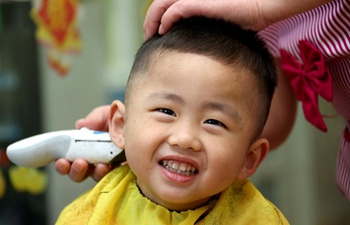LHASA, March 9 (Xinhua) -- Effortlessly cutting slices from a gigot while chatting with local herdsmen in fluent Tibetan, Ji Qiumei, thin and wearing glasses, fits right into the prairie.
Born in 1965, Ji has studied Tibetan yaks for 30 years. In this field, she is the sole female researcher and the only one with a doctoral degree.
Aiming to help herders out of poverty through her research, Ji sees grasslands and pastures as her laboratories. In recent years, she has made frequent trips to Damxung County in the northwest outskirt of Lhasa, capital of southwest China's Tibet Autonomous Region, where projects like large-scale grass planting and intensive yak fattening are being carried out.
Ji Qiumei had been raised in a pasture. She has known yaks since childhood and understood that for Tibetan herders, yaks are the most important source of food as well as income.
In 1988, she graduated from the Southwest University for Nationalities and later studied in the Chinese Academy of Sciences. She finished her doctoral degree at the International Potato Center in Peru.
Upon her return from Peru in 2002, Ji undertook research focusing on the Tibetan yak. She and her team have achieved a lot in increasing yaks' milk yield, reproduction rate, and meat production.
They also established an embryo transplantation method for yaks, an important step forward in yak breeding.
Achievements did not come without a cost. Decades of working in the fields on the plateau worsened the doctor's heart condition. She has had three heart surgeries.
Ji Qiumei always returned to her work once recovered, devoting both her mind and her body to the study of Tibetan yaks.

















